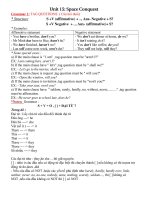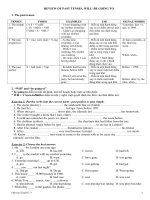Grammar worksheet + exercise: be used to, get used to, used to
Bạn đang xem bản rút gọn của tài liệu. Xem và tải ngay bản đầy đủ của tài liệu tại đây (184.82 KB, 5 trang )
<span class='text_page_counter'>(1)</span><div class='page_container' data-page=1>
Be used to
If you are used to something, you have often done or experienced it; it is not strange, new or
difficult for you.
<i>I</i><sub></sub><sub></sub><i><b>am</b></i><sub></sub><sub></sub><i><b>used</b></i><sub></sub><sub></sub><i><b>to</b></i><sub></sub><sub></sub><i>getting</i><sub></sub><sub></sub><i>up</i><sub></sub><sub></sub><i>early</i><sub></sub><i>in</i><sub></sub> <sub></sub><sub></sub><i>the</i><sub></sub><sub></sub><i>morning.</i><sub></sub><sub></sub><i>I</i><sub></sub><sub></sub><i>don't</i><sub></sub><sub></sub><i>mind</i><sub></sub><sub></sub><i>it</i><sub></sub>.
<i>Structure: be used to + noun phrase or be used to + verb (-ing</i> form)
<i>He</i><sub></sub><sub></sub><i>didn't</i><sub></sub><sub></sub><i>complain</i><sub></sub><sub></sub><i>about</i><sub></sub><sub></sub><i>the</i><sub></sub><sub></sub><i>neighbours’</i><sub></sub><sub></sub><i>loud</i><sub></sub><i>party</i><sub></sub> <sub></sub><sub></sub><i>–</i><sub></sub><sub></sub><i>he</i><sub></sub><sub></sub><i><b>was</b></i><sub></sub><sub></sub><i><b>used</b></i><sub></sub><sub></sub><i><b>to</b></i><sub></sub><sub></sub><i>the</i><sub></sub><sub></sub><i>noise. </i>
<i>We</i><sub></sub><sub></sub><i>live</i><sub></sub><sub></sub><i>near</i><sub></sub><sub></sub><i>a</i><sub></sub><sub></sub><i>forest</i><sub></sub><sub></sub><i>so</i><sub></sub><sub></sub><i>we</i><sub></sub><i><b>’re</b></i><sub></sub><sub></sub><i><b>used</b></i><sub></sub><sub></sub><i><b>to</b></i><sub></sub><sub></sub><i><b>seeing</b></i><sub></sub><i>animals</i><sub></sub> <sub></sub><sub></sub><i>in</i><sub></sub><sub></sub><i>our</i><sub></sub><sub></sub><i>garden. </i>
We can also say be used to someone.
<i>I</i><sub></sub><sub></sub><i>don’t</i><sub></sub><sub></sub><i>think</i><sub></sub><sub></sub><i>Tom’s</i><sub></sub><sub></sub><i>strange</i><sub></sub><sub></sub><i>–</i><sub></sub><sub></sub><i>I</i><sub></sub><i><b>’m</b></i><sub></sub><sub></sub><i><b>used</b></i><sub></sub><sub></sub><i><b>to</b></i><sub></sub><sub></sub><i><b>him</b></i><sub></sub><i>. </i>
Negative: be not used to
<i>I</i><sub></sub><sub></sub><i>don't</i><sub></sub><sub></sub><i>understand</i><sub></sub><sub></sub><i>him:</i><sub></sub><sub></sub><i>I</i><sub></sub><i><b>'m</b></i><sub></sub><sub></sub><i><b>not</b></i><sub></sub><sub></sub><i><b>used</b></i><sub></sub><sub></sub><i><b>to</b></i><sub></sub><sub></sub><i>his</i><sub></sub><sub></sub><i>accent</i><sub></sub><sub></sub><i>yet. </i>
<i>I</i><sub></sub><sub></sub><i><b>am</b></i><sub></sub><sub></sub><i><b>not</b></i><sub></sub><sub></sub><i><b>used</b></i><sub></sub><sub></sub><i><b>to</b></i><sub></sub><i>getting</i><sub></sub> <sub></sub><sub></sub><i>up</i><sub></sub><sub></sub><i>early</i><sub></sub><sub></sub><i>in</i><sub></sub><sub></sub><i>the</i><sub></sub><sub></sub><i>morning. </i>
▼
Get used to
If you get used to something, you become accustomed to it; it is no longer unusual or strange.
Get used to is the process of becoming used to something.
<i>After</i><sub></sub><sub></sub><i>a</i><sub></sub><sub></sub><i>while</i><sub></sub><sub></sub><i>he</i><sub></sub><sub></sub><i>didn't</i><sub></sub><sub></sub><i>mind</i><sub></sub><sub></sub><i>the</i><sub></sub><sub></sub><i>noise</i><sub></sub><sub></sub><i>in</i><sub></sub><sub></sub><i>the</i><sub></sub><sub></sub><i>office;</i><sub></sub><sub></sub><i>he</i><sub></sub><sub></sub><i><b>got</b></i><sub></sub><sub></sub><i><b>used</b></i><sub></sub><sub></sub><i><b>to</b></i><sub></sub><sub></sub><i>it. </i>
<i>Living</i><sub></sub><sub></sub><i>abroad</i><sub></sub><sub></sub><i>was</i><sub></sub><sub></sub><i>a</i><sub></sub><sub></sub><i>shock</i><sub></sub><sub></sub><i>at</i><sub></sub><sub></sub><i>first,</i><sub></sub><i>but</i><sub></sub> <sub></sub><sub></sub><i>I’</i><sub></sub><i><b>m</b></i><sub></sub><sub></sub><i>slowly</i><sub></sub><sub></sub><i><b>getting</b></i><sub></sub><sub></sub><i><b>used</b></i><sub></sub><sub></sub><i><b>to</b></i><sub></sub><sub></sub><i>it. </i>
Structure:
Get used to + something/someone
<i><b>Get used to + verb (-ing</b></i> form)
<i>I</i><sub></sub><sub></sub><i><b>got</b></i><sub></sub><sub></sub><i><b>used</b></i><sub></sub><sub></sub><i><b>to</b></i><sub></sub><sub></sub><i><b>his</b></i><sub></sub><sub></sub><i><b>Scottish</b></i><sub></sub><sub></sub><i><b>accent</b></i><sub></sub><sub></sub><i>after</i><sub></sub><sub></sub><i>a</i><sub></sub><sub></sub><i>while. </i>
</div>
<span class='text_page_counter'>(2)</span><div class='page_container' data-page=2>
<i>Used to + verb infinitive refers to a habit or state in the past. It is used only</i> in the past simple
tense.
Past habits
If you used to do something, you did it for a period of time in the past, but you don't do it any
more.
<i>We</i><sub></sub><sub></sub><i><b>used</b></i><sub></sub><sub></sub><i><b>to</b></i><sub></sub><sub></sub><i><b>live</b></i><sub></sub><sub></sub><i>in</i><sub></sub><sub></sub><i>London. </i>
= We lived in London in the past, but don’t live there now.
<i>I</i><sub></sub><sub></sub><i><b>used</b></i><sub></sub><sub></sub><i><b>to</b></i><sub></sub><sub></sub><i><b>walk</b></i><sub></sub><sub></sub><i>to</i><sub></sub><sub></sub><i>school</i><sub></sub><i>every</i><sub></sub> <sub></sub><sub></sub><i>day</i><sub></sub><sub></sub><i>when</i><sub></sub><i>I</i><sub></sub><sub></sub><sub></sub><i>was</i><sub></sub><sub></sub><i>a</i><sub></sub><sub></sub><i>child. </i>
Past states
We also say used to to express a state that existed in the past but doesn't exist now. States are
<i>not actions. We express states with stative verbs such as have,</i><i>believe,</i><sub></sub><sub></sub><i>know</i><sub></sub><i><sub> and like. </sub></i>
<i>I</i><sub></sub><sub></sub><i><b>used</b></i><sub></sub><sub></sub><i><b>to</b></i><sub></sub><sub></sub><i><b>like</b></i><sub></sub><sub></sub><i>The</i><sub></sub><sub></sub><i>Beatles,</i><sub></sub><i>but</i><sub></sub> <sub></sub><sub></sub><i>now</i><sub></sub><sub></sub><i>I</i><sub></sub><i>never</i><sub></sub> <sub></sub><sub></sub><i>listen</i><sub></sub><sub></sub><i>to</i><sub></sub><sub></sub><i>them. </i>
<i>He</i><sub></sub><sub></sub><i><b>used</b></i><sub></sub><sub></sub><i><b>to</b></i><sub></sub><sub></sub><i><b>have</b></i><sub></sub><sub></sub><i>long</i><sub></sub><i>hair,</i><sub></sub> <sub></sub><sub></sub><i>but</i><sub></sub><sub></sub><i>now</i><sub></sub><sub></sub><i>it’s</i><sub></sub><sub></sub><i>very</i><sub></sub><sub></sub><i>short. </i>
<i>I</i><sub></sub><sub></sub><i><b>used</b></i><sub></sub><sub></sub><i><b>to</b></i><sub></sub><sub></sub><i><b>believe</b></i><sub></sub><sub></sub><i>in</i><sub></sub><i>magic</i><sub></sub> <sub></sub><sub></sub><i>when</i><sub></sub><sub></sub><i>I</i><sub></sub><sub></sub><i>was</i><sub></sub><sub></sub><i>a</i><sub></sub><sub></sub><i>child. </i>
Questions: did(n't) + subject + use to + verb
<i><b>Did</b></i><sub></sub><sub></sub><i><b>he</b></i><sub></sub><sub></sub><i><b>use</b></i><sub></sub><sub></sub><i><b>to</b></i><sub></sub><sub></sub><i><b>work</b></i><sub></sub><sub></sub><i>in</i><sub></sub><sub></sub><i>your</i><sub></sub><sub></sub><i>office? </i>
<i><b>Didn't</b></i><sub></sub><sub></sub><i><b>he</b></i><sub></sub><sub></sub><i><b>use</b></i><sub></sub><sub></sub><i><b>to</b></i><sub></sub><sub></sub><i><b>work</b></i><sub></sub><sub></sub><i>in</i><sub></sub><sub></sub><i>your</i><sub></sub><sub></sub><i>office? </i>
Negatives: subject + didn't + use to + verb or subject + never + used to + verb
<i>I</i><sub></sub><sub></sub><i><b>didn't</b></i><sub></sub><sub></sub><i><b>use</b></i><sub></sub><sub></sub><i><b>to</b></i><sub></sub><sub></sub><i><b>like</b></i><sub></sub><i>wine,</i><sub></sub> <sub></sub><sub></sub><i>but</i><sub></sub><sub></sub><i>now</i><sub></sub><sub></sub><i>I</i><sub></sub><sub></sub><i>love</i><sub></sub><sub></sub><i>it. </i>
<i>I</i><sub></sub><sub></sub><i><b>never</b></i><sub></sub><sub></sub><i><b>used</b></i><sub></sub><sub></sub><i><b>to</b></i><sub></sub><sub></sub><i><b>like</b></i><sub></sub><i>wine,</i><sub></sub> <sub></sub><sub></sub><i>but</i><sub></sub><sub></sub><i>now</i><sub></sub><sub></sub><i>I</i><sub></sub><sub></sub><i>love</i><sub></sub><sub></sub><i>it. </i>
</div>
<span class='text_page_counter'>(3)</span><div class='page_container' data-page=3>
English grammar practice exercise, intermediate
<i>In this exercise you will practise used</i><i>to</i><sub></sub><i><sub>, be</sub></i><sub></sub><sub></sub><i>used</i><sub></sub><i>to</i><sub></sub> <sub></sub><i><sub> and get</sub></i><sub></sub><sub></sub><i>used</i><sub></sub><sub></sub><i>to</i><sub></sub>.
<b>Exercise instructions </b>
Choose the best answer to fill the gap in each of the following.
1. When I started to work here I needed a lot of help, but now I ______ all the work on my own.
<b>a.</b> <sub>am used to doing b. used to do c. get used to doing </sub>
2. He ______ several books a month, but he doesn't have time any more.
<b>a.</b> <sub>was used to reading b. got used to reading c. used to read </sub>
3. We were surprised to see her driving –<sub></sub><sub> she ______ when we first met her. </sub>
<b>a.</b> <sub>didn't use to drive b. got used to driving c. was used to driving </sub>
4. Don't worry, it's a simple program to use. You ______ it in no time, I'm sure.
<b>a.</b> <sub>used to use b. are used to c. will get used to </sub>
5. When I had to commute to work every day I ______ very early.
<b>a.</b> <sub>used to getting up b. used to get up </sub>
6. I'm afraid I'll never ______ in this place. I simply don't like it and never will.
<b>a.</b> <sub>got used to living b. used to live c. get used to living </sub>
7. Whenever we came to Coventry we always ______ in the Central Hotel. We loved it.
<b>a.</b> <sub>used to stay b. got used to staying </sub>
</div>
<span class='text_page_counter'>(4)</span><div class='page_container' data-page=4>
8. When Pete Smith was the head of our office everything ______ well organized. Now it's total
chaos here.
<b>a.</b> <sub>got used to be b. was used to being c. used to be </sub>
9. Mr Lazy was shocked when he joined our busy company because he ______ doing much
work everyday.
<b>a.</b> <sub>wasn't used to b. didn't use to </sub>
10. At first the employees didn't like the new open-space office, but in the end they ______ it.
<b>a.</b> <sub>got used to b. get used to c. are used to </sub>
<b> </b>
Key on next page
</div>
<span class='text_page_counter'>(5)</span><div class='page_container' data-page=5>
<b> </b>
<b>Exercise key</b>
1. When I started to work here I needed a lot of help, but now I a. am used to doing all the work
on my own.
2. He c. used to read several books a month, but he doesn't have time any more.
3. We were surprised to see her driving –<sub></sub><sub> she a. didn't use to drive when we first met her. </sub>
4. Don't worry, it's a simple program to use. You c. will get used to it in no time, I'm sure.
5. When I had to commute to work every day I b. used to get up very early.
6. I'm afraid I'll never c. get used to living in this place. I simply don't like it and never will.
7. Whenever we came to Coventry we always a. used to stay in the Central Hotel. We loved it.
8. When Pete Smith was the head of our office everything c. used to be well organized. Now
it's total chaos here.
9. Mr Lazy was shocked when he joined our busy company because he a. wasn't used to doing
much work everyday.
10. At first the employees didn't like the new open-space office, but in the end they a. got used
to it.
Online version of this exercise />
</div>
<!--links-->
<a href=' /> be going to
- 1
- 565
- 2








